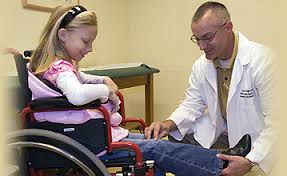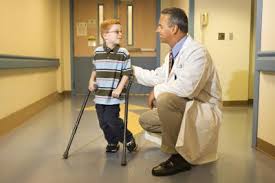What is a Pediatric Orthopedic Surgeon?
If your child has musculoskeletal (bone) problems, a pediatric orthopedic surgeon has the experience and qualifications to treat your child.
What Kind of Training Do Pediatric Orthopedic Surgeons Have?
Pediatric orthopedic surgeons are medical doctors who have
- Graduated from an approved medical school
- Graduated from an approved orthopedic surgery residency program
- Completed additional subspecialty training in pediatric orthopedics
Pediatric orthopedic surgeons treat children from the newborn stage through the teenage years. They choose to make pediatric care the core of their medical practice, and the unique nature of medical and surgical care of children is learned from advanced training and experience in practice.

Unique Aspects of Orthopedic Care for Kids
Sometimes kids thought of as small adults. When it comes to bones, that is definitely not the case, and there are special considerations that need to be taken into consideration when treating orthopedic issues in children.
Children are growing, often very quickly, and the areas where bone is growing most quickly, called the growth plate, can be susceptible to injury. A child’s bone is also more elastic (it can bend, without breaking all the way through) and has a capacity to remodel over time.
While healing of a growth plate injury often occurs very quickly because of the rapid growth occurring at that site, a doctor will need to ensure the growth plate was not damaged or if special treatment of that growth plate is needed.
Unrecognized injuries to a growth plate can lead to growth abnormalities such as early closure of the growth plate, or abnormal growth of the bone.
It’s also important that any age-specific lifestyle concerns or long-term issues related to a pediatric orthopedic condition are considered, especially when weighing treatment options. For example:
- Does the child need to restrict her activities? If so, how so and for how long
- Should she avoid specific sports, running, or jumping?
- Will the condition affect further growth and development?
- Is the condition likely to lead to long-term problems or require further treatment?
- Could this lead to any future limitations?

What Kind Of Problems Do Pediatric Orthopedists Treat?
Pediatric orthopedists diagnose, treat, and manage children’s musculoskeletal problems. A child’s musculoskeletal problems are different from those of an adult since their bodies are still growing. A child’s response to injury, infection, or deformity can be different than what is often seen in adults.
Some of the problems pediatric orthopedists treat include:
- Limb and spine deformities
- Gait abnormalities
- Broken bones
- Bone or joint infections or tumors

When should I take my child to a Pediatric Orthopaedic Surgeon?
Pediatric orthopaedic surgeons diagnose and treat a variety of problems with the arms, legs and spine. Problems walking, crooked limbs, legs of different lengths, curves in the spine, broken bones, bone/joint infections or tumors, and birth defects of the hands or feet are just some examples of the conditions that may require a pediatric orthopaedic surgeon.Children with complex pediatric problems such as developmental delay, skeletal dysplasias, or other syndromes are usually best managed by a multidisciplinary, medical-surgical team.
Why does my child need a specialist?
Children are not just small adults. Their growing bones pose different challenges than those of adults. Sometimes, what looks like a problem in a child is just a variation that the child will outgrow over time. Some common pediatric problems don’t even occur in adults. Pediatric orthopedic surgeons, their offices, and supporting staff are all equipped to deal with kids and families to create a comfortable, patient-focused and family-friendly environment.
Helping Kids Feel Well
One of the most important things parents and other family and friends can do for kids with an orthopedic ailment is learn how to support their child. Injuries, illnesses, and medical conditions can cause anxiety and depression in kids, and knowing how to support children is an important role for parents to take.
Do not be afraid to ask for help from your child’s orthopedic specialist or their pediatrician. These individuals have vast experience working with kids who have faced similar problems and should be able to help you navigate what is likely new territory for you.
In the same light, don’t hesitate to tell medical professionals how you think your child can be helped. You know your child better than anyone else—their fears, their anxieties, their comforts—and sharing this with their medical team can help them take better care of your child.
Some simple tips to help with a child facing an orthopedic treatment:
- Encourage your child to ask questions and address those questions seriously
- Reinforce brave behaviors with praise
- Don’t say “it won’t hurt” unless it truly won’t
- Be supportive, comforting, and encouraging—a hug and a smile go a long way